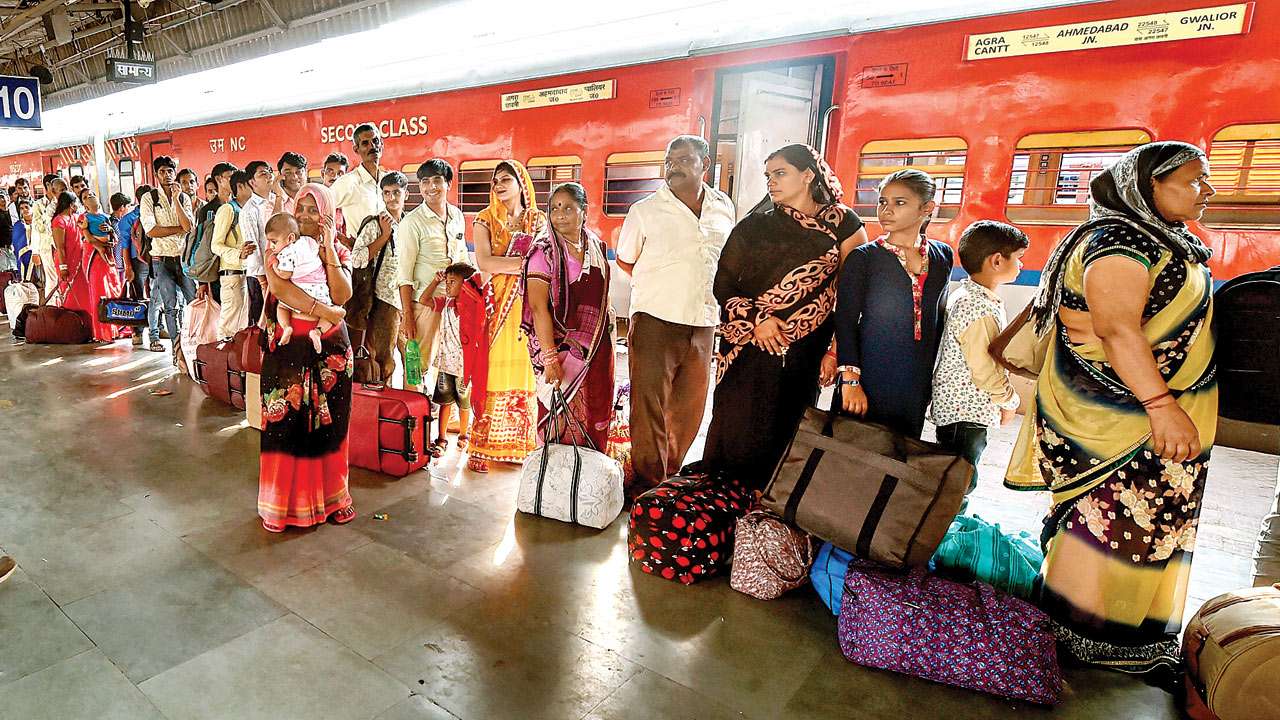
The recent attacks on migrant labourers from Bihar and Uttar Pradesh in Gujarat triggered a fresh bout of exodus, revealing socio-economic cross-currents that seemed to have spun out of control. In such cases, politicians move in quickly and naturally to fish in troubled waters.
Not that this was the first time North Indians, particularly migrant labourers from UP and Bihar, were targeted by natives. States other than Gujarat — Maharashtra and Karnataka — or, more specifically, cities of Mumbai and Bengaluru — have earned the distinction of being particularly combative towards migrants, which also included labourers from Assam and West Bengal. Over the years, there have been incidents of violence against migrants in these cities leading to massive exodus.
Yet, recent incidents of violence against migrants in Gujarat does qualify as breaking news. Once it was the Gujaratis, the backbone of Mumbai trade and commerce, who were the victims of parochial sentiments in Mumbai following the creation of the Gujarat state along linguistic lines, out of the Bombay state. The formation of the Shiv Sena by Bal Thackeray, who rode the tiger of Maratha chauvinism, only added to the woes of Gujaratis and migrants from south India, particularly ‘Madrasis’.
The Shiv Sena still refuses to dismount that tiger, only that it has now partly outsourced the job to Maharashtra Navnirman Sena (MNS), bearing the same political DNA. And Gujarat, in a rare moment of epiphany, has transformed from victim to aggressor to join the ‘elite’ club. Gujaratis fail to realise they have been the most peripatetic communities of India who travelled far and wide for work opportunities, thus breaking new frontiers of enterprise.
The rape of a toddler, allegedly by a migrant worker, outraged the nativist feelings as locals vented their ire on the community of migrant workers. Soon, the violence had spread to seven districts in north Gujarat hastening the exodus. This was a fertile ground for politicians to exploit the situation for their narrow gains.
It has been alleged that Congress MLA Alpesh Thakor’s outfit Gujarat Kshatriya Thakor Sena (GKTS) has been involved in several incidents of attacks on migrants following the September 28 incident. A video clip of Thakor was also in circulation where he was seen provoking locals over the rape incident. Thakor and his ‘sena’ hid behind the excuse that migrants were stealing away “their jobs”. What could have been tackled at the level of state’s law enforcement agencies, Thakor and his ‘sena’ tarred the entire beleaguered migrant community with a nativist brush and took it upon themselves to teach the community a lesson.
The message from the party’s central leadership left much to be desired. Instead of taking Thakor to task for his political rhetoric of hate, Rahul seemed to condone his remarks, blaming it on economics and the state government’s inability to generate employment.
While the economic spin to the entire controversy may not be off the mark, Rahul’s statement only seemed to justify the violence. The sham ‘sadbhavna’ sit-in by Thakor and his cohorts to decry violence was only aimed at taking the sting away from sustained criticism from the BJP for creating the social divide.
Cosmopolitan cities like Mumbai, Bengaluru, Kolkata, Hyderabd, Delhi-NCR and Ahmedabad have always attracted big money in terms of investments from industry captains. These cities in turn have a magnetic pull for migrants from neighbouring and far off states and turn into employment hubs. The influx of workers from states like UP, Bihar, West Bengal and Jharkhand is higher since these states have traditionally lagged behind in development.
With diminishing employment opportunities in their native states, workers are forced to explore jobs in states which hold better prospects for them in the private, unorganised sectors. These workers carry no baggage and are ready to work on rates less than the prevailing market price. The employers do not think twice about hiring them as they save on labour costs. It’s a quid pro quo that is mutually beneficially to both.
State governments across the political spectrum have enacted laws mandating job guarantees in industrial sector for locals. The TRS government in Telangana, for instance, has mandated 95 per cent jobs to locals. Even Gujarat has a similar law guaranteeing 80 per cent jobs to domiciled residents. The demand by Patidars for inclusion in Other Backward Classes for a share in job reservation hasn’t lessened the problems of the BJP government in the state.
But in the GST era where checkposts are being brought down and global free movement of labour and services is becoming the new norm, it is rather self-defeating to see parties and state governments pandering to vote-bank politics in providing job protection to domiciled residents. Will it not breed a culture of regionalism and lead to aggressive chavunism in a country whose image has already been tarred by incidents of mobocracy and lynching?
The river dispute among some of the southern states should serve as an example of how short-sightedness and brinksmanship can spoil the day for India as a republic.
That does not mean we can afford to take our attention away from lop-sided growth that is only increasing the income inequality. The narrative of BIMARU states refuses to die down despite promises of fast-paced development by some states in the last decade. Who shall take the blame for the faltering growth rates in these states?
Regional players are increasingly asserting themselves, demanding their just share from the central resource pool and raring to be part of the growth story. But are we pushing the envelope enough? Are we also aware of its attendant cost that threatens to tear our social fabric apart.
The writer is a senior journalist and author of Newsroom Live